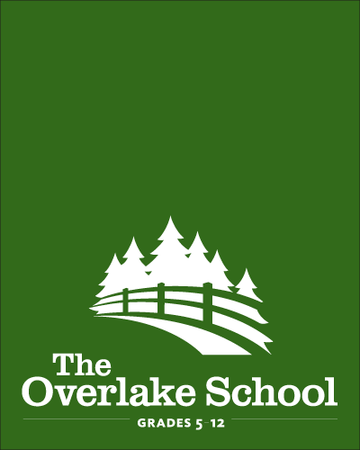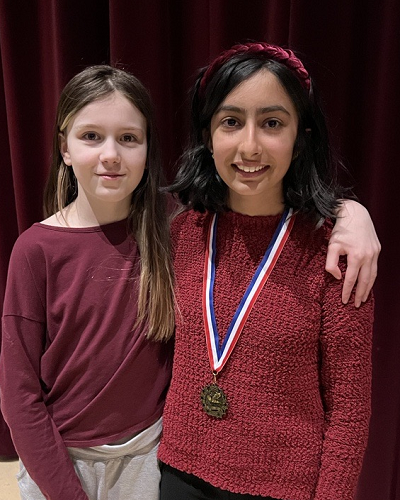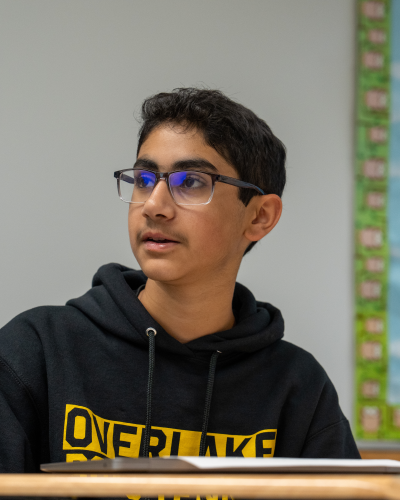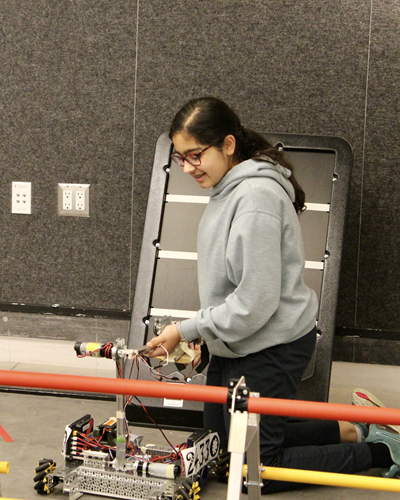Information Literacy & Technology
The mission of Overlake’s Technology Program is to provide technological leadership, expertise, and systems to support learning. Our vision is to cultivate an inclusive community of learners who comprehend and control the transformational power of technology for good, recognizing the social and moral impact of modern technologies. We seek to foster the intentional use of technology to better live Overlake’s mission and values, and in doing so, to promote the lifelong skill of learning how to learn.
The school's academic departments, library and technology staff work together to support the school's mission and curricular goals.
To that end, Overlake offers discrete courses in technology that are collaborations with other academic departments, such as Math and Computer Science, Arts, and Social Studies. We place a strong emphasis on technology integration into all academic courses with assistance from our Instructional Coach for Technology and our technology team. Our student device program and our learning management system, Canvas, are also critical tools in integrating technology throughout the program. Please visit the Technology site to learn more about technology at Overlake.
AP Computer Science
Algebra II
AP Computer Science covers the course content defined by the College Board's AP curriculum and prepares students for the advanced placement exam in May. The course teaches the Java programming language and reviews and elaborates on the fundamental methods of object-oriented programming. Much of the material is based on the implementation and analysis of common data structures including arrays and array lists. Basic algorithms for sorting and searching are presented and their asymptotic behavior is analyzed. Students enhance their program design, implementation, testing, and debugging skills through frequent programming projects. Finally, they gain experience reading, understanding and modifying a substantial pre-existing program.
View the College Board AP Computer Science Course Description.
AP Statistics
Algebra II
The purpose of the AP course in statistics is to introduce students to the major concepts and tools for collecting, analyzing and drawing conclusions from data. Students are exposed to four broad conceptual themes:
- Exploring Data: Describing patterns and departures from patterns
- Sampling and Experimentation: Planning and conducting a study
- Anticipating Patterns: Exploring random phenomena using probability and simulation
- Statistical Inference: Estimating population parameters and testing hypotheses
Successful AP statistics students have good quantitative reasoning, good reading comprehension, clear written communication and consistent study habits. Students will be challenged to think critically about data, to use statistical methods with a deep level of understanding, and to write persuasive responses to real-world questions. A graphing calculator will be the student’s constant companion.
Art | Art & Technology
In Art and Technology, students will be using various forms of “high tech” and “low tech” to create imaginative works of art. The class will focus on the basics of Adobe Illustrator and Photoshop for design and photography projects, ProCreate for the iPad to explore digital drawing and simple animation, and more. In addition, students will have the opportunity to design their own projects using the skills they gained through experimenting, taking creative risks, practicing, and refining, all while having fun in the process.
Art | Digital Media
Students will develop their creative storytelling skills and learn the fundamentals of digital video production, animation, and audio editing. Through a series of creative projects, students will develop their technical skills and artistic expression, while also understanding the ethical and responsible use of digital tools and AI-generated digital art. Students will develop creative problem-solving and project-management skills while collaborating to communicate in a digital environment. They will think critically about media consumption and production while working through the full production process from concept to publishing. Topics will include storyboarding, filming techniques, video editing, audio recording, editing, and mixing.
Art | Graphic Design
Graphic Design is web sites, signs, products, books, clothing, and more! Basically, it’s everywhere! In this course, students will learn how to use design as a means of visually communicating ideas. Students will learn Adobe Photoshop, Adobe Illustrator, Procreate, and use hands-on materials to produce logo designs, posters, food packaging, book jackets, and more. In addition, students will learn about different designers and what it means to work in the Graphic Design field as a career. This is a great course for those who want to apply their creativity to a practical application and for those who want to learn new skills in the visual arts.
Graphic Design is everywhere. It’s the web sites you use, the signs you see, on the products you use, the covers of the books you read, the logos and labels on the clothing you wear, and so much more more! In this course, students will learn how to use graphic design as a means of visually communicating ideas. Students will learn Adobe Photoshop, Adobe Illustrator, ProCreate for iPads, and use hands-on materials to produce logo designs, posters, food packaging, and more. In addition, students will learn about different designers and what it means to work in the Graphic Design field as a career. This is a great course for those who want to apply their creativity to a practical application and for those who want to learn new skills in the visual arts.
Art | Media Production
Media Production is a hands-on course where students explore the world of video, audio, and digital media creation. In this class, students will learn the fundamentals of producing content using industry-standard tools and software, including Adobe Premiere, After Effects, and Audition. Through individual and group projects, students will develop skills in storytelling, camera operation, sound design, and post-production. Whether creating short films, podcasts, or digital content for social media, students will gain practical experience that prepares them for further study or careers in media production.
Art | Photography 1
We all have the ability to take picture with the fancy, tiny computer in our pockets, but how can you take great photographs that say something beyond the “selfie” and the candid? Looking at and creating photographs is an incredible way for people to connect, and to appreciate the world around us. This course will help students become thoughtful fine art photographers through shooting and editing photographs using digital cameras (DSLR)*, cell phone cameras, and Adobe programs. Each student will build a web site portfolio and make prints to show off their work. *Students do not need to have their own digital camera to take this course.
Art | Photography 2
Photography 1 If you have prior photography experience, but have not taken a course at Overlake, you will need to show examples of your work and get written permission from Danielle Troy.
Photography 2 is a deeper exploration of photography as fine art. Students will continue working with digital photography while focusing on creativity through skill building. We will spend time viewing photographs in all genres from around the globe and explore the more personal side of making art. Photography 2 also allows students to explore film photography and darkroom printing. Tools used for this class will be cell phone cameras, smartphone apps, digital SLR cameras, Adobe Photoshop and Lightroom. Students do not need to have their own digital camera to take this course.
Post-AP CS: App Development
Successful completion of AP Computer Science or equivalent. Questions about permission should be emailed to the department chair.
Programming language: Java. Students with a working knowledge of object-oriented programming fundamentals in java will be given the opportunity to further practice and extend those skills in this applied course. This course focuses on student engagement in the learning process through a practical, collaborative approach that allows for a creative and authentic experience. The majority of activities will be centered around learning and practicing the details of developing mobile apps using core OOP principles and various APIs available. Concepts related to the process rather than coding, such as best practices of mobile development and strategies of completing large projects in teams, will be presented and implemented as well. The final goal of the course will be to complete, in a group, a thoroughly polished Android app incorporating all skills learned during the semester.
Post-AP CS: Data Structures
Successful completion of AP Computer Science or equivalent. Questions about permission should be emailed to the department chair.
Programming Language: Java. The AP Computer Science prerequisite course prepares students with little to no prior experience to understand and engage in object-oriented programming with the Java language. This course gives students the skills generally attained during the second course in a college-level CS introductory sequence. The goals of this course build upon and extend the content from the AP course, requiring a thorough understanding of the previous learning objectives. This course primarily presents concepts of data abstraction and encapsulation. The structures taught and implemented include stacks, queues, linked lists and binary trees, as well as comparisons to arrays and array lists. Students also gain experience with recursion, analysis of complexity, and use of predefined collection classes. They use the concepts presented in class to create, debug, modify, and test a variety of programming projects of differing complexity.
Technology and Social Change: Life in the Coming Years
Most social studies courses explore the past. This course explores the future. What will the coming decades be like? How will current and newly developing technologies alter not only our daily lives but perhaps what it means to be human? How will an internet a billion times more powerful than today’s empower humanity? What changes might augmented reality and AI bring? What happens when machine intelligence surpasses human intelligence? Given that the coming decades will likely bring the greatest changes in human history so far, what do you need to know to better understand our rapidly changing world? What challenges, dangers, and opportunities lie before us and what skills might you need to successfully navigate the future? Although we will explore multiple areas of coming change, most of the course will focus on technological changes based on current expert predictions for the next 20 years and less certain theories about the decades beyond.
Theater | Theater Tech
This class is dedicated to learning the fundamentals of theatre design and technology. Students will become familiar with the different areas of design: costume, scenic, lights and sound, and they will have time to experiment with the tools we use to bring these designs to life. Students gain a deeper understanding of how theatre technology supports a performance and will have a chance to showcase their skills by working on practical projects for school productions.
Contact
Jay Heath
Director of Technology, Institutional Research, and Strategic Plan Management
jheath@overlake.org
425-602-7172



